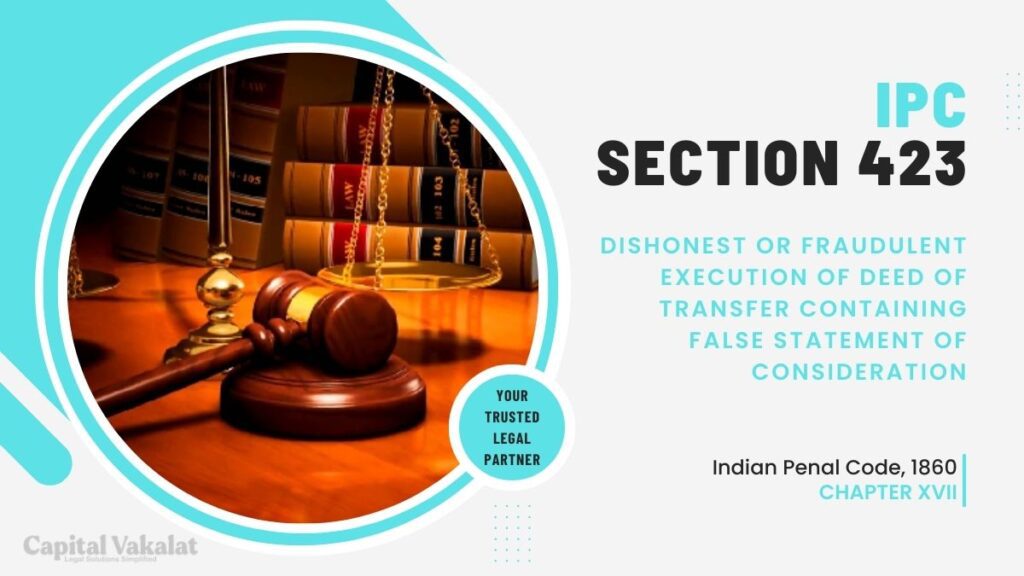In the realm of property transactions, honesty and transparency are the cornerstones of a fair and just system. Section 423 of the Indian Penal Code (IPC) specifically addresses the dishonest or fraudulent execution of a deed of transfer containing false statements of consideration.

This article delves into the intricacies of this legal provision, exploring its significance, implications, and real-world applications.
Definition of Section 423 IPC
Section 423 IPC, an integral part of India’s legal framework, aims to curb deceptive practices in property transactions. It holds individuals accountable for executing deeds of transfer dishonestly or fraudulently, particularly when they contain false statements regarding consideration.
Importance of Honest and Transparent Transactions
The foundation of a robust property market lies in transactions built on trust. Honest dealings not only protect the interests of the parties involved but also contribute to the overall health of the real estate sector.
Understanding Dishonest or Fraudulent Execution
Explanation of Deceptive Practices in Deed of Transfer
Dishonest execution involves various deceptive practices during the transfer of property. This could range from intentional misrepresentation to hiding crucial information that could affect the transaction.
Legal Implications of Fraudulent Execution
Fraudulent execution takes dishonest practices a step further, implying a deliberate intent to deceive. Understanding the legal implications is essential to grasp the severity of such actions and their consequences.
False Statements of Consideration
Significance of Consideration in a Deed of Transfer
Consideration, the value exchanged between parties in a property transaction, holds immense legal significance. It is a crucial element in determining the validity and fairness of the transaction.
Consequences of Including False Statements
Including false statements regarding consideration in a deed of transfer is a serious offense. It not only compromises the integrity of the transaction but also has legal repercussions under Section 423 IPC.
Legal Framework of Section 423 IPC
Overview of Section 423 IPC
Section 423 IPC outlines the specific provisions related to dishonest or fraudulent execution of deeds of transfer. Understanding its nuances is vital for legal practitioners, property professionals, and individuals involved in real estate transactions.
Elements and Requirements for a Violation
To establish a violation under Section 423 IPC, certain elements and requirements must be met. This section breaks down the key aspects that constitute an offense.
Real-Life Examples
Case Studies Illustrating Dishonest Execution
Examining real-life case studies provides valuable insights into the practical applications of Section 423 IPC. These examples shed light on the varied scenarios that can lead to dishonest execution.
Legal Outcomes and Precedents
Analyzing the legal outcomes and precedents set by previous cases helps to gauge the severity of the offenses and the corresponding penalties imposed.
Consequences and Penalties
Judicial Actions Against Fraudulent Execution
Section 423 IPC empowers the judiciary to take strict actions against individuals found guilty of fraudulent execution. Understanding the legal proceedings is crucial for both legal professionals and the general public.
Penalties and Repercussions Under Section 423 IPC
The penalties for violating Section 423 IPC are significant, reflecting the gravity of fraudulent execution in property transactions. This section explores the potential legal consequences faced by offenders.
Prevention and Due Diligence
Importance of Due Diligence in Property Transactions
Preventing fraudulent execution starts with thorough due diligence. This involves verifying information, conducting background checks, and ensuring all aspects of the transaction are transparent.
Best Practices to Avoid Fraudulent Execution
Implementing best practices can significantly reduce the risk of fraudulent execution. From documentation to verification processes, this section outlines actionable steps for a secure property transaction.
Challenges in Prosecution
Identifying Intent and Proving Fraudulent Execution
Prosecuting cases under Section 423 IPC poses challenges, especially in identifying the intent behind the execution and providing concrete evidence of fraudulent practices.
Legal Challenges Faced by Prosecutors
Legal professionals face specific challenges in presenting a strong case under Section 423 IPC. This section explores the hurdles prosecutors encounter and potential solutions.
Impact on Property Transactions
Deterrence Effect on Property Market
A stringent application of Section 423 IPC serves as a deterrent, discouraging individuals from engaging in dishonest or fraudulent practices. This has a positive impact on the overall integrity of the property market.
Building Trust and Transparency in Real Estate
Promoting ethical practices fosters trust among stakeholders in the real estate sector. This section emphasizes the role of Section 423 IPC in building a transparent and trustworthy property market.
Conclusion
In conclusion, Section 423 IPC plays a pivotal role in upholding the integrity of property transactions. By addressing dishonest and fraudulent execution of deeds of transfer, this legal provision contributes to a fair and just real estate environment. It is incumbent upon all parties involved to adhere to ethical practices, ensuring the sustainability and growth of the property market.
Frequently Asked Questions
What constitutes false statements of consideration in a deed of transfer?
False statements of consideration can include intentional misrepresentation of the property’s value or any deceptive practices related to the transaction.
How can individuals ensure due diligence in property transactions?
Conducting thorough background checks, verifying documentation, and seeking legal advice are key steps to ensure due diligence in property transactions.
What are the potential legal consequences of violating Section 423 IPC?
Violating Section 423 IPC can result in severe penalties, including fines and imprisonment, depending on the gravity of the offense.
Does Section 423 IPC apply to transactions involving inherited properties?
Yes, Section 423 IPC applies to all property transactions, irrespective of whether the property is inherited or not.